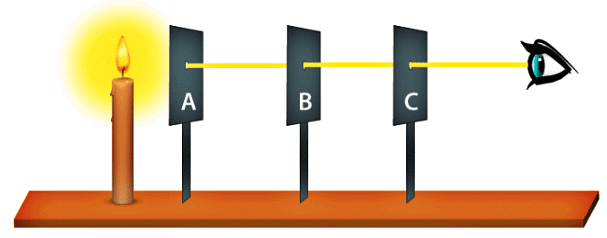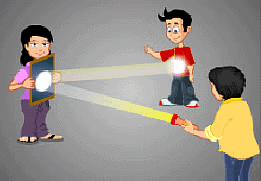Class 6 Exam > Class 6 Notes > Science Olympiad Class 6 > Olympiad Notes: Light, Shadows and Reflections
Olympiad Notes: Light, Shadows and Reflections | Science Olympiad Class 6 PDF Download
| Table of contents |

|
| Light |

|
| Transparent Opaque and Translucent Objects |

|
| Shadows |

|
| Pinhole Camera |

|
| Light travels in a straight line |

|
| Mirror and Reflection |

|
Light
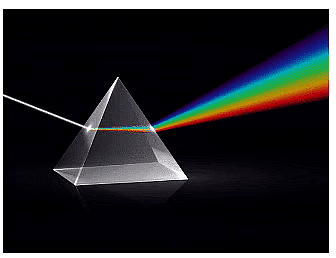
- Light is a type of energy responsible for our sense of sight, allowing us to perceive the world around us.
- It facilitates the visibility of various objects such as trees, vehicles, houses, and people.
- Darkness occurs at night due to the absence of sunlight, reducing our ability to see clearly.
- Objects emitting light are known as Luminous Objects, examples being the sun, bulbs, and tube lights.
- Non-Luminous Objects do not emit light themselves; they become visible when light from a luminous source reflects off them and reaches our eyes. Examples include trees, animals, shoes, and the moon (which appears to glow due to sunlight reflecting off it).
Transparent Opaque and Translucent Objects
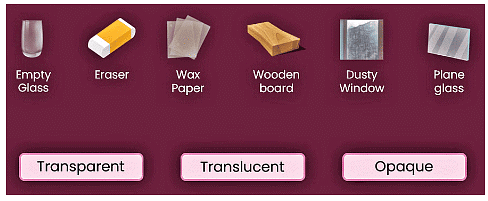
Objects are categorized based on their light-permeability into three types: Opaque, Translucent, and Transparent.
Opaque
- Opaque objects do not permit light to pass through them.
- Opaque examples include walls, doors, and trees.
Translucent
- Translucent objects allow partial passage of light, though visibility through them is limited.
- Translucent examples comprise materials like polythene, butter paper, and thin plastic sheets.
Transparent
- Transparent objects enable complete transmission of light, offering clear visibility.
- Transparent instances consist of substances like air, water, and clear glass.
Shadows
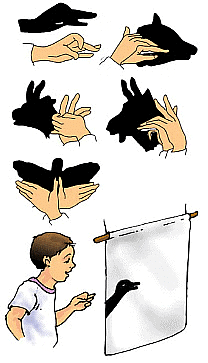
- A shadow results from the obstruction of light by an opaque object, creating a space devoid of light from a light source.
- When an object blocks some light, it forms a shadow; if it blocks all light, no shadow will be visible.
- The shape of a shadow mirrors that of the object causing it, although the size may differ.
- Similar objects may cast shadows with identical shapes as they block similar amounts of light.
- Shadows require both a light source and an opaque object; they cannot form in completely dark rooms or fully illuminated rooms lacking opaque objects.
- Screens like walls or the ground typically display shadows.
- Shadows appear black or grey, regardless of the color of the object casting the shadow.
Pinhole Camera
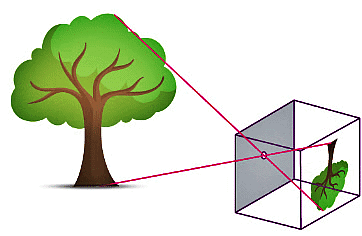
- A pinhole camera, lacking a lens, is a basic camera shaped like a box with a small hole on one side, projecting an inverted image of the external environment onto the opposite side.
- Optimal clarity is achieved by painting both the inside and outside of the box black.
- The object intended for image capture should be positioned in bright light.
- The smaller the hole, the sharper the resulting image.
- If a tracing paper is used as a screen, temporary black and white images are formed. For permanent colored or black and white images, photographic films can replace the tracing paper.
- A diagram illustrates two boxes nested within each other. The outer object's inverted image is projected onto the translucent screen within the inner box.
Light travels in a straight line
- Light inherently moves in straight lines.
- Shadows are created when opaque objects obstruct these straight-moving light rays.
- Shadows cannot form if light rays do not maintain their straight-line trajectory.
Mirror and Reflection
- Reflection occurs when light waves alter their direction upon striking a surface. Mirrors are objects known for reflecting light.
- Surfaces that are shiny and polished often function as mirrors.
- The reflection process allows the image of an object to be visible in the mirror.
- Mirrors redirect the path of incoming light upon contact.
The document Olympiad Notes: Light, Shadows and Reflections | Science Olympiad Class 6 is a part of the Class 6 Course Science Olympiad Class 6.
All you need of Class 6 at this link: Class 6
|
34 videos|116 docs|89 tests
|
FAQs on Olympiad Notes: Light, Shadows and Reflections - Science Olympiad Class 6
| 1. What are some examples of opaque objects? |  |
Ans. Opaque objects are those that do not allow any light to pass through them. Some examples of opaque objects are wood, metal, brick, and cardboard.
| 2. How does light travel? |  |
Ans. Light travels in a straight line. When light is emitted from a source, such as the sun or a lamp, it travels in a straight path until it encounters an obstacle or is absorbed by a surface.
| 3. What is a pinhole camera? |  |
Ans. A pinhole camera is a simple camera without a lens. It consists of a small hole (pinhole) on one side and a screen or film on the other side. When light passes through the pinhole, it forms an inverted image on the screen or film.
| 4. What are some examples of translucent objects? |  |
Ans. Translucent objects are those that allow some light to pass through them but not enough to see clearly through. Some examples of translucent objects are frosted glass, wax paper, and some plastics.
| 5. How does a mirror reflect light? |  |
Ans. Mirrors reflect light due to the smooth surface and the reflective coating on the back. When light hits the mirror, it bounces off at the same angle as it arrived, resulting in a clear reflection.
Related Searches

